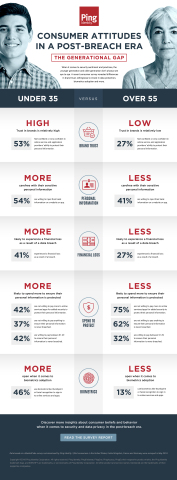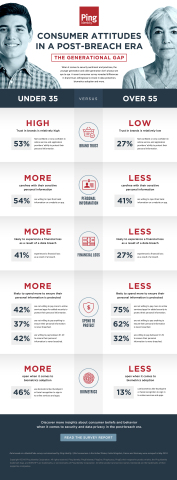DENVER--(BUSINESS WIRE)--Ping Identity, the leader in Identity Defined Security, today released results of the Ping Identity 2018 Consumer Survey: Attitudes and Behavior in a Post-Breach Era, unveiling consumer sentiments and behaviors toward security and brands impacted by data breaches. Ping surveyed more than 3,000 people across the United States, United Kingdom, France and Germany to find out what they expect from brands when it comes to the safekeeping of personal information. The survey reveals many consumers are making drastic changes to the ways they interact with companies and secure their own personal data following a breach:
- 78 percent of respondents would stop engaging with a brand online and more than one third (36 percent) would stop engaging altogether if the brand had experienced a breach.
- Nearly half (49 percent) would not sign up and use an online service or application that recently experienced a data breach.
- Almost half (47 percent) have made changes to the way they secure their personal data as a result of recent breaches and over half (54 percent) are more concerned with protecting their personal information today than they were a year ago.
“With the prevalence of data breaches and leaks, enterprises must have the proper controls in place or they become at risk of losing consumer trust and business,” said Sarah Squire, CTO Office, Ping Identity. “In the same way that brands are expected to provide user-friendly experiences, they also must understand the value and importance of strong identity management strategies.”
Added Squire, “The findings from our 2018 survey reveal the extent to which consumers value security and rely on the brands they interact with to provide a layer of protection when it comes to their identity and personal information.”
Younger Generation Has Higher Trust in Brands
Ping found the greatest discrepancies in security sentiment and practices between those under 35 and those over 55. While the younger generation has greater confidence in brands’ ability to protect their personal information and is more likely to spend more to ensure their personal information is protected, the older group guards their sensitive information more carefully and is less likely to have experienced financial loss as a result of a data breach.
- 53 percent of respondents under 35 feel confident or very confident in online services and applications providers’ ability to protect their personal information, compared with 27 percent of those over 55.
- 54 percent of respondents under 35 are willing to input their bank information on a website or application, compared with 41 percent of those over 55.
- 37 percent of respondents under 35 are not willing to pay anything to ensure their personal information is never breached, compared with 62 percent of those over 55.
Americans are Nearly Twice as Likely to Share Sensitive Information with Brands
Similarly, differences in consumer security behaviors varied depending on where they live. Americans are more carefree with their sensitive personal information; the French are not so confident in brands’ ability to protect their personal information; the British are the least likely to have experienced a data breach; and Germans are more likely to abandon Facebook Connect following the Cambridge Analytica scandal.
- Americans are more likely to share their social security numbers with brands than other countries (16 percent, versus 9 percent France, 6 percent Germany and 4 percent UK).
- The French are the least confident in online services and app providers’ ability to protect personal information (38 percent are confident or very confident in providers, versus 48 percent U.S., 48 percent UK and 42 percent Germany).
- UK respondents (15 percent) are less likely to have experienced a breach than those in the U.S. (27 percent), France (21 percent) or Germany (17 percent). However, of those who have experienced a breach in the UK, 42 percent experienced a financial loss as a result (versus 24 percent in the U.S., 38 percent in Germany and 43 percent in France).
“While consumers clearly place a high value on security, the data also shows that there are limits to how much effort they are going to make or how much they are willing to pay for it,” shared Garrett Bekker, Principal Security Analyst, 451 Research. “This suggests that the burden should fall on vendors and service providers to offer a secure online experience—and rightly so. Consumers don’t go into a restaurant and expect to pay more to ensure they don’t get sick. And if consumers don’t feel secure, the data highlights the cost to vendors in terms of lost customers.”
For more information on the Ping Identity 2018 Consumer Survey: Attitudes and Behavior in a Post-Breach Era, click here.
Survey Methodology
Ping Identity surveyed a representative sample of 3,264 adults in the United States, United Kingdom, France and Germany who are at least 18 years old and use at least one of these online sites or services: shopping, banking, movie/TV, music, government services, travel or Uber/Lyft-type apps. Additionally, respondents must have entered at least one of the following on a website or app in the past 12 months: address, date of birth, phone number, credit card number, bank information, social security number or driver’s license number. The geographic breakdown of survey respondents is as follows: U.S. - 1,004; UK - 753; France - 754; Germany - 753. The survey was conducted online between May 21 and May 25, 2018. The margin of error is plus or minus 1.7 percentage points.
About Ping Identity | The Identity Defined Security Company
Ping Identity envisions a digital world powered by identity. As the identity security company, we simplify how the world’s largest organizations prevent security breaches, increase employee and partner productivity and provide personalized customer experiences. Enterprises choose Ping for our identity expertise, open standards leadership, partnership with companies like Microsoft, Amazon and Google, and collaboration with customers like Boeing, Cisco, GE, Kraft Foods, Walgreens and over half of the Fortune 100. The Ping Intelligent Identity Platform allows enterprises and their users to securely access cloud, mobile and on-premises applications while managing identity and profile data at scale. Architects and developers have flexible options to enhance and extend their existing applications and environments with multi-factor authentication, single sign-on, access management, directory, data governance and intelligent API security capabilities. Visit www.pingidentity.com.
Ping Identity Corporation
Follow Us on Twitter: @PingIdentity
Join
our LinkedIn Group: Ping
Identity
Subscribe to our YouTube Channel: PingIdentityTV
Like
Us on Facebook: PingIdentityPage




